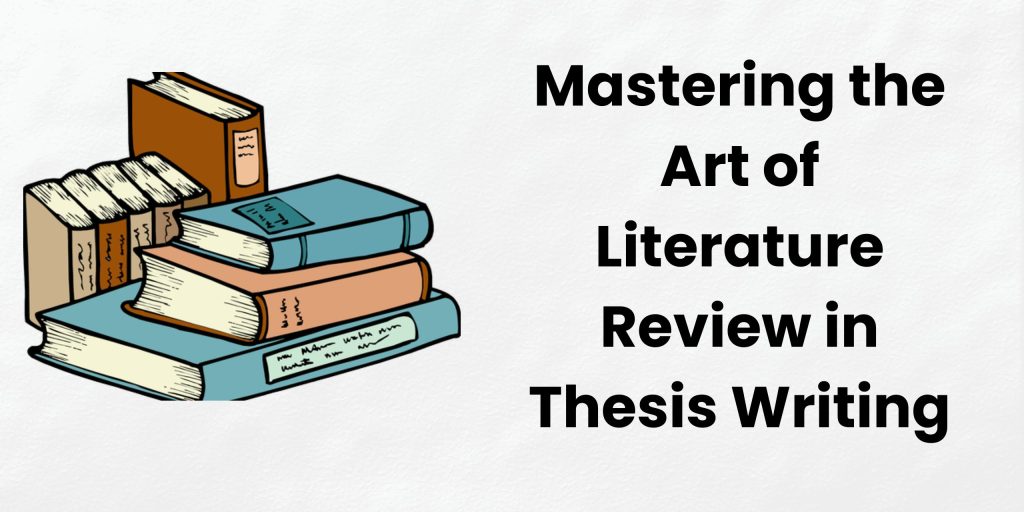A literature review is a critical component of thesis writing that involves a comprehensive analysis and synthesis of existing research and scholarly literature related to your topic. It serves as the foundation for your study, providing context, theoretical framework, and supporting evidence for your research questions. Mastering the art of conducting a literature review is crucial to producing a well-informed and rigorous thesis. Here are some key steps to help you excel in this aspect of your thesis writing:
- Define the Scope and Objectives: Before diving into the literature review, clearly define the scope and objectives of your review. Identify the specific research questions or themes you want to explore. This will guide your search process and help you stay focused on relevant literature.
- Develop a Search Strategy: Crafting an effective search strategy is essential to locate relevant literature efficiently. Start by identifying keywords and phrases that accurately represent your topic. Utilize academic databases, library catalogs, and search engines to conduct your search. Use Boolean operators (AND, OR, NOT) and truncation symbols (*) to refine and expand your search terms as needed.
- Select and Evaluate Sources: Evaluate the credibility, relevance, and quality of potential sources. Select scholarly articles, books, conference papers, and other reliable sources that contribute to your research topic. Consider factors such as the author’s expertise, publication venue, peer-review process, and the recency of the source. Take notes on key findings, methodologies used, and gaps identified in the literature.
- Organize and Summarize: Organize your sources and develop a systematic approach to summarize the main findings and arguments. Create an annotated bibliography or use citation management tools like EndNote or Zotero to keep track of your sources. Summarize each source’s key points, methodologies, and contributions to the field. Identify common themes, trends, and areas of agreement or disagreement among the literature.
- Analyze and Synthesize: Move beyond summarizing individual sources and strive for a deeper analysis and synthesis of the literature. Look for patterns, theoretical frameworks, methodologies, and gaps within the existing research. Identify relationships, contradictions, or limitations in the literature. Develop a coherent narrative that connects the studies and provides a theoretical foundation for your research.
- Critically Evaluate: Engage in critical thinking while evaluating the literature. Assess the strengths and weaknesses of individual studies, methodologies employed, and the validity of the findings. Identify any biases or limitations in the research. Consider alternative viewpoints or conflicting evidence that may challenge existing theories or concepts. This critical evaluation will strengthen the credibility and robustness of your literature review.
- Identify Research Gaps: Identify gaps or areas of insufficient research in the existing literature. Look for unanswered questions, methodological limitations, or emerging topics that need further exploration. These research gaps will guide the formulation of your research questions and provide opportunities for original contributions in your thesis.
- Maintain Consistent Formatting and Referencing: Follow a consistent formatting style (e.g., APA, MLA, Chicago) for citations and references throughout your literature review. Ensure accurate and complete citations for each source. Use citation management tools to organize your references and generate bibliographies effortlessly.
- Continuously Revise and Update: Keep your literature review up to date by continuously revisiting and revising it throughout your thesis writing process. As new research emerges, evaluate its relevance and incorporate it into your literature review if necessary. Revise your literature review to reflect any changes or new insights that arise during your research.
- Seek Feedback and Collaboration: Engage with your advisor, peers, or mentors to seek feedback on your literature review. They can provide valuable insights, identify gaps or missed sources, and offer suggestions for improvement. Collaborate with others in your field to gain different perspectives and access additional resources.
Mastering the art of literature review is an ongoing process that requires persistence, critical thinking, and a systematic approach. By following these steps, you can conduct a comprehensive and well-structured literature review that lays a strong foundation for your thesis. Remember to stay organized, keep track of your sources, and be diligent in analyzing and synthesizing the literature. A well-executed literature review will showcase your expertise and contribute to the overall quality and credibility of your thesis.v
